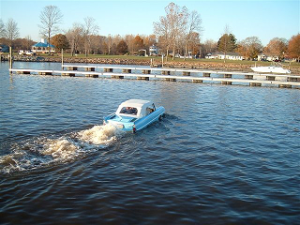 We have houses in two states. We therefore have cars in two states. However, we can only be a resident of one of those states. This month one or our cars came due for registration renewal, so we turned to the local Department of Motor Vehicles (DMV). So far, so good, right? Not so fast! In the state where we are no longer residents, a required document to renew a vehicle registration is that state’s drivers’ license–which we no longer have! So we contacted the DMV multiple times to see what could be done. Answers ranged from “you need to take the vehicle to the other state to get inspected then bring it back here” (1400 miles away), to “you need to register it in the other state”, to “it can’t be done period, if you don’t have an in-state license”. This does not seem like an out of the ordinary question: surely we are not the first people with this situation! However, trying to get an answer from the DMV is not an ordinary experience. We finally got it resolved through dogged persistence, but this episode made me ponder the role of service providers in general. Making customers suffer a Kafkaesque experience shouldn’t be the model.
We have houses in two states. We therefore have cars in two states. However, we can only be a resident of one of those states. This month one or our cars came due for registration renewal, so we turned to the local Department of Motor Vehicles (DMV). So far, so good, right? Not so fast! In the state where we are no longer residents, a required document to renew a vehicle registration is that state’s drivers’ license–which we no longer have! So we contacted the DMV multiple times to see what could be done. Answers ranged from “you need to take the vehicle to the other state to get inspected then bring it back here” (1400 miles away), to “you need to register it in the other state”, to “it can’t be done period, if you don’t have an in-state license”. This does not seem like an out of the ordinary question: surely we are not the first people with this situation! However, trying to get an answer from the DMV is not an ordinary experience. We finally got it resolved through dogged persistence, but this episode made me ponder the role of service providers in general. Making customers suffer a Kafkaesque experience shouldn’t be the model.
Have you ever called technical support and gotten what you consider a nonsense answer, and when you call back the second answer you get is not only different, but does not make any more sense than the first one? It is similar to our experience with the DMV. On our state’s official DMV website there is no mention of how to get an automobile registered if you have an out of state drivers’ license; there is plenty of information on how to register a boat if you are not a resident, though. So I called the number on the site and after being put on hold a nice person told me that what I wanted to do was not possible. I asked why you should be able to register a boat with an out of state license but not a car. Turns out, it’s because a boat is using the waterways, but a car is on the roads. Of course it is: how could I be so stupid! Ahem. That did not answer the question as to why my identification was good enough for a boat but not an automobile, though. My wife called and got a different answer to the question: all we had to do was get an inspection and pay the fee (which turned out not to be true). How could two people have gotten such different answers to the same question?
One way to deal with this is to ask your peers what they would do. They have likely also experienced a frustrating technical support call, and maybe they have found a workaround (i.e., escalate right away) or perhaps know of another vendor that actually fixes things without the hassle. With the DMV being the only game in town, we were stuck. But we did try our own advice. We asked our accountant and insurance agent. They both said that their customers tell them they sometimes just go in to the DMV and it works and other times it doesn’t and they end up registering the car in another state. Sigh. It seemed like explaining how to set up a wireless network: sometimes it works, sometimes it doesn’t. Signals come and signals go. Magic.
Another idea: When you finally get a technician that actually seems to know something, write that down. Remember that person for next time! On the DMV issue what we did was take copies of every utility bill we had and went to the DMV. After the interminable inspection lines we had to wait another hour in line to get to the registration window. Once there we were asked if we could provide the out of state registration card for one of the vehicles we own in the other state to verify that we had cars in another state. Er, what? Not quite knowing how to respond to this, we instead kept waving the bills around, pointing to addresses and… a miracle happened.
After thinking about the process we went through it became apparent to me that the reason that our business continues to grow is that OEM service and support uses the DMV model and Zerowait goes in the opposite direction. When a customer calls in with an issue they speak to an engineer that knows what they are talking about. The customers information is verified and the problem is worked based on the idea of let’s get this working right now. At Zerowait we know that no two storage networks are the same, but they all need to provide data to clients. Instead of creating roadblocks to solutions like the DMV, our goal is to create pathways to the successful restoration of data. Make the customer happy. Is that the goal of the DMV or your OEM service provider?




